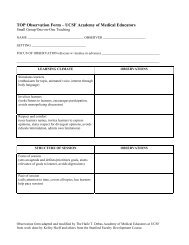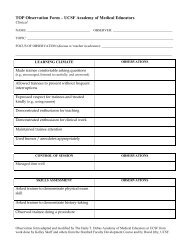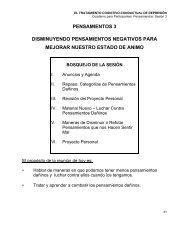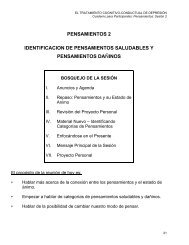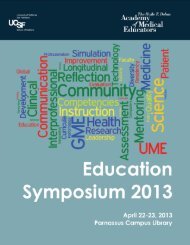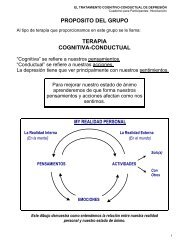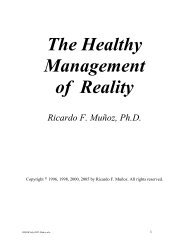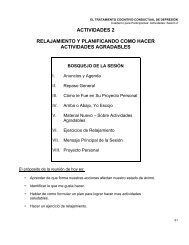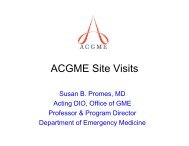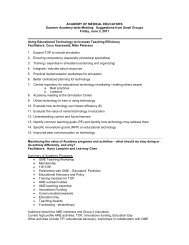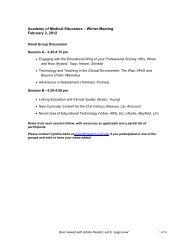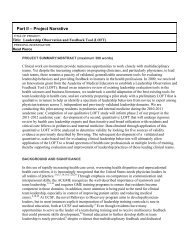2011 - UCSF School of Medicine - University of California, San ...
2011 - UCSF School of Medicine - University of California, San ...
2011 - UCSF School of Medicine - University of California, San ...
You also want an ePaper? Increase the reach of your titles
YUMPU automatically turns print PDFs into web optimized ePapers that Google loves.
<strong>UCSF</strong> Education Day <strong>2011</strong>17 commonly ordered diagnostic tests. A percent (%)error was calculated for each diagnostic test as [(meanestimated – actual)/actual] x 100. Participants alsoresponded to eight attitudinal questions using a 5-pointLikert scale.Results: Thirty-six attendings and 92 residentscompleted the survey, representing a response rate <strong>of</strong>75% and 82% respectively. All participants regardless <strong>of</strong>their level <strong>of</strong> training grossly under-estimated hospitalcharges (mean error -41.4%), and over-estimatedMedicare reimbursement (mean error +152%).Participants rated their own knowledge <strong>of</strong> costs as poor(2 out <strong>of</strong> 5) and their interest in receiving educationabout costs as high (4.2 out <strong>of</strong> 5).Discussion: At a single academic medical center,internal medicine residents and faculty demonstratedpoor knowledge <strong>of</strong> hospital charges for diagnostic tests.Given this finding and participants’ interest in receivingeducation about medical costs, curricular interventionsaimed at improving physician knowledge <strong>of</strong> healthcarefinances would be appropriate.Reflective critique: Based on these results, acurriculum on costs <strong>of</strong> care is being developed for theresidency program. Additionally, a table outlininghospital charges and Medicare reimbursement forcommonly ordered diagnostic tests will be published inthe next edition <strong>of</strong> the Hospitalist Handbook.Faculty Development to SupportCompetency Based MedicalEducation in Tanzania- A SituationAnalysisMolly Fyfe, MA, MPH, <strong>UCSF</strong> Global Health Sciences,mollyfyfe@yahoo.com; Charles MKony, Muhimbili<strong>University</strong> <strong>of</strong> Health and Allied Sciences,charles_mkony@yahoo.com; Kelli Barbour, <strong>UCSF</strong>Global Health Sciences, kelli.barbour@ucsf.edu;Dorothy Perry, <strong>UCSF</strong> <strong>School</strong> <strong>of</strong> Dentistry,PerryD@dentistry.ucsf.edu; Patricia O’Sullivan, <strong>UCSF</strong><strong>School</strong> <strong>of</strong> <strong>Medicine</strong>, OSullivanP@medsch.ucsf.edu;Sarah MacFarlane, <strong>UCSF</strong> Global Health Sciences,macfarlane@globalhealth.ucsf.eduAreas abstract covers: Faculty DevelopmentDomain(s) addressed: Faculty Development, GlobalHealthPurpose: To use data from graduates, students andfaculty to identify needs in faculty development.Background: Tanzania faces a severe shortage <strong>of</strong>health pr<strong>of</strong>essionals. Muhimbili <strong>University</strong> <strong>of</strong> Health andAllied Sciences (MUHAS) is the largest public healthpr<strong>of</strong>essions university in Tanzania. With the goal <strong>of</strong>enhancing the quality <strong>of</strong> health care graduates, a jointMUHAS and <strong>UCSF</strong> team assessed the facultydevelopment needs at MUHAS.Methods: In 2009, 147 recent MUHAS graduates andtheir supervisors (n=48) were surveyed on theirperceptions <strong>of</strong> how well MUHAS prepared them forpr<strong>of</strong>essional practice. Students (n=41) in 6 focus groupsprovided their perceptions <strong>of</strong> the learning environment.Three faculty focus groups (n=32) revealed needs forfurther pr<strong>of</strong>essional development.Results: MUHAS students, alumni and supervisorsrecognized a need for teaching beyond pr<strong>of</strong>essionalknowledge. Students acknowledge that the lectures areeffective, but they have limited exposure to otherpedagogical methods, identifying needs for activelearning, early and strong clinical experience and facultymentoring. The faculty identified the need to employtechnology, and improve their own teaching mentoringskills.Discussion: MUHAS needs to improve the teaching andlearning process in competencies other thanpr<strong>of</strong>essional knowledge. Both teachers and studentswould benefit from improved mentoring as a key startingpoint. Based on this situation analysis, facultydevelopment will target educational strategies for activelearning in large and small group settings, clinicalteaching skills, and mentoring.Reflective critique: This information has beenpresented by colleagues from MUHAS and based onfeedback we believe would be <strong>of</strong> interest at <strong>UCSF</strong>.Faculty-Narrated Web-BasedLearning Modules Improve Students’Communication Skills on a High-Stakes Clinical Skills ExaminationChristina A. Lee, MD, <strong>UCSF</strong>,christinaaudreylee@gmail.com; Anna Chang, MD, <strong>San</strong>Francisco Veteran Affairs Medical Center,anna.chang2@va.gov; Calvin L. Chou, MD, PhD, <strong>San</strong>Francisco Veteran Affairs Medical Center,calvin.chou@ucsf.edu; Christy Boscardin, PhD, <strong>UCSF</strong>,BoscardinCK@medsch.ucsf.edu; Karen Hauer, MD,<strong>UCSF</strong>, khauer@medicine.ucsf.eduAreas abstract covers: UMEDomain(s) addressed: Clinical Instruction andPerformance, Communication, Curricular Innovation,Standardized PatientsPurpose: To determine whether a web-based SPmodule with detailed SP and faculty commentary used30 The Haile T. Debas Academy <strong>of</strong> Medical Educators



